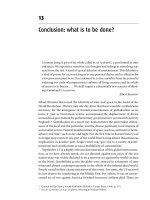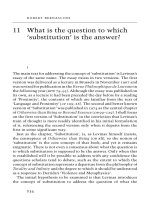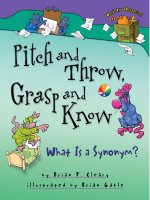what is clause (A clause is a group of words that contains a subject and a finite verb)
Bạn đang xem bản rút gọn của tài liệu. Xem và tải ngay bản đầy đủ của tài liệu tại đây (659.97 KB, 8 trang )
The clause
I get slimmer and slimmer since I drink coffee.
clauseclause
Complex sentence
WHAT I S CLAUS E?
WHAT IS CLAUSE?
Ac laus e is a group of words that contains a
subject and a finite verb.
Ex: I get slimmer and slimmer
S V
Ac laus e constitutes only part of a sentence
Ex: since I drink coffee
In each complex sentence, we have at least two
clauses: main clause and subordinate clause
Ex: I get slimmer and slimmer since I drink coffee
He arrived as the clock was striking
Types of clause
Main clause
(independent clause)
These can stand
alone because they
express complete
thoughts.
Subordinate clause
(dependent clause)
These can’t stand alone
and need another clause to
complete their meaning.
Ex:
I went to school although I was ill.
s v
He bumped into the wall when the lights went out.
She wish that she knew the reason
Subordinate clause
There are 3 kinds of subordinate clause: noun, adjective, and adverb
gfgghgnggggggggdis
ghxhgxsjhajhabBDJ
HSGDJHGDJHSDJH
VXHDVHSVDHAVVS
XHS
Subordinate clause
There are 3 kinds of subordinate clause: noun, adjective, and adverb
- An adjective clause is often called a
relative clause because it relates
back to a noun whose meaning it
modifies.
- They are often introduced by special
words called relative pronouns: who,
whose, whom, that, which, where,
when, why.
Ex:
The woman who looked happy danced
The town where they met was called
Smalltown.
I remember the day when we met each
other.
Subordinate clause
There are 3 kinds of subordinate clause: noun, adjective, and adverb
An adverbial clause
functions like an adverb in
giving information about
when, where, why, how or
if an action occurred
Ex:
Put it where we can all see it
They won the match because
they were the best players
Complete sentence
Noun
clause
Main clause
Simple sentence
(complete
meaning)
Subordinate
clause
Adjective
(related)
clause
Adverb
clause
Thank you for listening!









